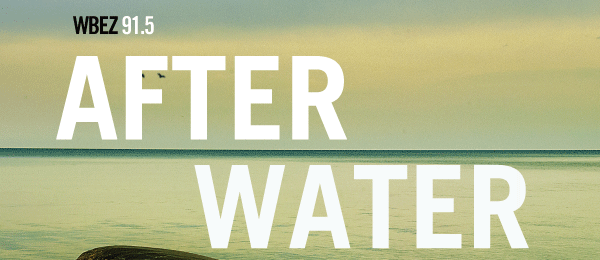After Water: Science, art and journalism around climate change
By WBEZ

After Water: Science, art and journalism around climate change
By WBEZ
We want to contemplate the future from a dual lens of science and art. We’ll be sharing our writers’ stories and the science behind them here. It’s After Water. We invite your thoughts.
The stories
Local author Nnedi Okorafor starts out the series on Chicago’s South Side. In her story, “Poison Fish” (or, “Poison Poisson”), Okorafor brings us to a dystopian backdrop of memories and chaos, set along the waterfront on Chicago’s Rainbow Beach. Listen to an interview about this story with Nnedi Okorafor. Or hear some of the science behind her story.
In his story, “Thirst” Los Angeles-based author Max Andrew Dubinsky brings us to a California that’s dry and dying, its inhabitants looking to the Great Lakes as their last salvation. Listen to an interview about this story with Max Andrew Dubinsky. Or hear some of the science behind his story.
In “World After Water,” Abby Geni brings us to a city drowned in dirty, toxic water. Four young brothers are forced to steal filtered water from their wealthy neighbors in order to survive. Listen to an interview with Abby Geni about her story. Or hear about some of science behind her story.
In “The Floating City of New Chicago”, we see a Chicago divided by class…and water. The wealthy have fled the city for a secret island in Lake Michigan. The “wet-collar” workers have been left behind to do the city’s dirtiest jobs. Listen to author Tricia Bobeda talk about how she found inspiration in a 30 Rock episode. Or hear conversations about the science behind her story.
In “The Last Cribkeeper” we meet Harry Osgood as he walks along the shores of Lake Michigan. For years, he served as the guard for one of the water intake cribs miles from Chicago’s shores. Now an old man, Harry looks out over the lake and reflects on how it has shaped the city’s identity and his own. Listen to author Peter Orner talk about his lifelong fascination with the city’s water cribs. Or check out some of the science behind the story.
The science behind the stories
The short stories you’ve been listening to are solidly in the science fiction category. But some of the issues the writers touch on aren’t as far out as you might think. Before they jumped 100 years into the future, we paired writers with scientists and policy experts to talk about the threats facing the Great Lakes right now. You can hear our conversations about the science behind the stories below.
Front and Center is funded by The Joyce Foundation: Improving the quality of life in the Great Lakes region and across the country.